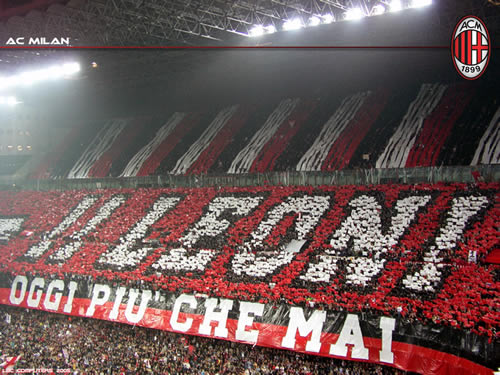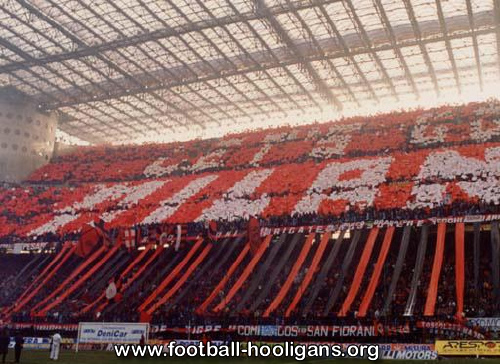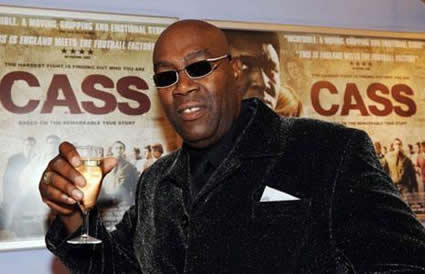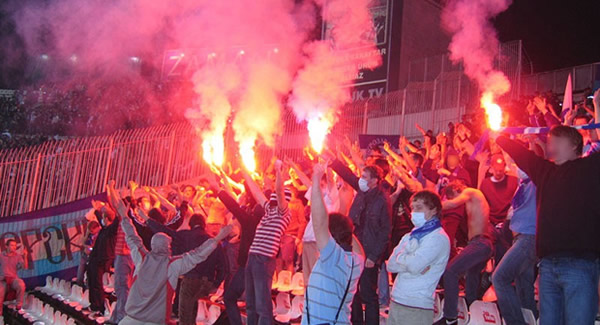
Hooligans at an association football match of
Spartak Moscow in November 2010.
Hooliganism is disruptive or unlawful behavior such as
rioting,
bullying, and
vandalism.
[edit] Etymology
There are several theories regarding the origin of the word
hooliganism.
The Compact Oxford English Dictionary states that the word may have originated from the surname of a fictional rowdy Irish family in a
music hall song of the 1890s.
[1][2] Clarence Rook, in his 1899 book,
Hooligan Nights, claimed that the word came from Patrick Hoolihan (or Hooligan), an
Irish bouncer and thief who lived in London.
[edit] Early usage of the term
The term
hooligan has been used since at least the mid 1890s at approximately the same time as Manchester's street gangs, known as the "
Scuttlers" were gaining notoriety. The first use of the term is unknown, but the word first appeared in print in London
police-court reports in 1894 referring to the name of a gang of youths in the
Lambeth area of London—the
Hooligan Boys,
[3] and later—the
O'Hooligan Boys.
[4] In August 1898 a murder in Lambeth committed by a member of the gang drew further attention to the word which was immediately popularized by the press.
[5] The London-based newspaper
Daily Graphic wrote in an article on 22 August 1898, "The avalanche of brutality which, under the name of 'Hooliganism' ... has cast such a dire slur on the social records of
South London".
[2][6]
Arthur Conan Doyle wrote in his 1904 novel
The Adventure of the Six Napoleons, "It seemed to be one of those senseless acts of Hooliganism which occur from time to time, and it was reported to the constable on the beat as such".
H.G. Wells wrote in his 1909 semi-autobiographical novel
Tono-Bungay, "Three energetic young men of the hooligan type, in neck-wraps and caps, were packing wooden cases with papered-up bottles, amidst much straw and confusion".
[6]
[edit] Modern use
Later, as the meaning of the word shifted slightly, none of the possible alternatives had precisely the same undertones of a person, usually young, who belongs to an informal group and commits acts of vandalism or criminal damage, starts fights, and who causes disturbances but is not a thief.
[6] In the
Soviet Union the word
khuligan was used to refer to scofflaws or political dissenters, “hooliganism” (rus. Хулига́нство) was listed as a criminal offense (similar to "
disorderly conduct" in some other jurisdictions) and used as a catch-all charge for prosecuting unapproved behavior.
[2] Matthias Rust was convicted of hooliganism, among other things, for his 1987 Cessna landing in
Red Square.
More recently, the same charge has been leveled against members of the
riot grrrl band
Pussy Riot for which three members have each received a two year sentence on 17 August 2012. "Hooliganism" is defined generally in Russia's criminal code as an "average gravity" crime.
[7]
[edit] Violence in sports
The word
hooliganism and
hooligan began to be associated with
violence in sports, in particular from the 1970s in the UK with
football hooliganism. The phenomenon, however, long preceded the modern term; for example, one of the earliest known instances of crowd violence at a sporting event took place in ancient
Constantinople. Two
chariot racing factions, the Blues and the Greens, were involved in the
Nika riots which lasted around a week in 532 CE; nearly half the city was burned or destroyed in addition to tens of thousands of deaths.
[8]
[edit] Hooliganism in film









